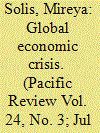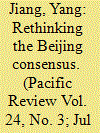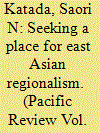|
|
|
Sort Order |
|
|
|
Items / Page
|
|
|
|
|
|
|
| Srl | Item |
| 1 |
ID:
106007


|
|
|
|
|
| Publication |
2011.
|
| Summary/Abstract |
This paper compares the current global financial crisis with the one that struck East Asia a little more than a decade ago. The analysis reveals some striking and surprising differences between the two periods. Whereas the first crisis had a catalytic impact on Asian regionalism this one may not. Despite East Asia generally and China in particular seeming to emerge stronger relative to the US from the current crisis, the impact of the second crisis on Europe reminds us that there is nothing inevitable about the course of regional integration. Not only are Europe's economic problems likely to diminish whatever enthusiasm there was for initiatives such as a common currency in Asia, but China may also find itself increasingly playing a global rather than a regional role. In short, crises can have very different impacts and provide an important insight into the interconnected dynamics of regional and global processes.
|
|
|
|
|
|
|
|
|
|
|
|
|
|
|
|
| 2 |
ID:
106004


|
|
|
|
|
| Publication |
2011.
|
| Summary/Abstract |
The global financial crisis of 2008-09 presented a critical challenge to East Asian regional financial cooperation. Over a decade of efforts to reduce regional vulnerability to financial crisis and contagion were confronted with the worst global economic crisis since the 1930s. The results for East Asia were mixed. On the one hand, no economies were forced to submit to IMF-led bailouts, as had happened so painfully in 1997-98. On the other hand, the most highly-developed component of the project of ASEAN+3 financial regionalism - the Chiang Mai Initiative (CMI), which set up a system of emergency liquidity provision - appeared irrelevant, as the central banks of South Korea and Singapore prioritized the establishment of new swap agreements with the United States as a means of ensuring dollar liquidity instead of relying on their Chiang Mai partners. Nonetheless, in May 2009, the ASEAN+3 finance ministers agreed to a substantial expansion and 'multilateralization' of the initiative. This paper critically addresses whether CMI has been transformed into an 'Asian Monetary Fund' and argues that the events of 2008-10 make substantial additional movement in that direction unlikely.
|
|
|
|
|
|
|
|
|
|
|
|
|
|
|
|
| 3 |
ID:
106005


|
|
|
|
|
| Publication |
2011.
|
| Summary/Abstract |
Political economists have long noted that the prospects for trade liberalization diminish in a climate of economic recession. A stagnant economy intensifies the burden of adjustment for non-competitive sectors and polarizes domestic trade politics. Not surprisingly, the global financial crisis has raised concerns of a substantial protectionist backlash, through the imposition of national measures that circumvent WTO disciplines such as anti-dumping or tied stimulus packages. The impact of economic crisis on regional integration is, however, more ambiguous and has not been explored systematically. On the one hand, policymakers may be pressed to renege on trade liberalization commitments on all fronts - also weakening the momentum to negotiate or implement free trade agreements (FTAs). On the other hand, policymakers may be tempted to 'insulate' their region from adverse global trends and may see FTAs as more amenable to political manipulation that shelters inefficient sectors. In order to shed light on the connection between external crisis and regionalist drive, this article assesses three main challenges East Asian elites confront in devising a regional trade bloc capable of acting as a growth locomotive: institutional fit, multilateralization, and architectural design. The track record of East Asian governments of negotiating FTAs to score diplomatic points abroad and ensure political survival at home - at the expense of maximizing economic gains through far-reaching liberalization - does not bode well for the magnitude of this challenge.
|
|
|
|
|
|
|
|
|
|
|
|
|
|
|
|
| 4 |
ID:
106006


|
|
|
|
|
| Publication |
2011.
|
| Summary/Abstract |
This paper discusses the role of the Beijing Consensus type of foreign and economic policymaking in China's development since the Asian financial crisis and in its response to the global crisis, and argues that it has been a double-edged sword, as reflected in several aspects. First, the lesson that China learned from the Asian financial crisis was not the importance of liberalisation but prudence or conservativeness, which despite serving as a shield this time sustains problems in the long term. Second, an obsession with foreign reserves accumulation and the pursuit of political influence have for a long time overshadowed the increasing dependence on the US market, putting China in a dilemma now in both development and diplomatic strategies. Third, centralised decision-making may be faster than democratic processes, but it may also go against the principle of 'scientific decision' as proposed by the Chinese leadership. A prominent feature of China's responses to the crisis is a bias towards state-owned enterprises and the public sector, which exacerbates the existing problems of monopoly, over-capacity, inequality, the regulators being 'captured' by industrial interests and protectionism. Given limited economic resources, domestic political contentions and the questionable credibility of the China Model, it would be difficult for China to practice 'responsible great power' diplomacy or assume leadership in the region or globally.
|
|
|
|
|
|
|
|
|
|
|
|
|
|
|
|
| 5 |
ID:
106003


|
|
|
|
|
| Publication |
2011.
|
| Summary/Abstract |
After the devastating experience of the Asian financial crisis more than ten years ago, East Asia launched regional economic cooperation efforts. East Asia's mixed response to the global financial crisis a decade later, however, reveals how certain impetuses that gave rise to unified efforts to regional institution building in East Asia at the time of the AFC derived, fundamentally, from the region's defensive desire as it positioned itself within the harsh global economic and political environment of that time. The GFC triggered reorganization of global economic governance by discrediting neoliberal principles, introducing a new global governance structure and allowing reliance of domestic stimuli for economic recovery. Those shifts, in turn, led to the loss of East Asia's basic mandate towards regional cooperation. In other words, the focus of solving the region's economic vulnerability has now moved from regional arrangement to national and global stages. In particular, the East Asian governments now see less of a need to counterweight the predominant neoliberal voice through unified regional voice as the expansion of the forum to discuss global economic governance to G20 and IMF reform to provide East Asia more representation.
|
|
|
|
|
|
|
|
|
|
|
|
|
|
|
|
|
|
|
|
|